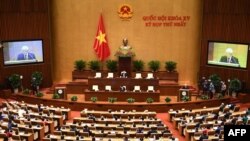Vietnam’s anti-corruption drive is expected to continue following the “forced” resignation of President Nguyen Xuan Phuc amid public distrust that has emerged with a series of scandals involving his subordinates and their handling of the COVID-19 pandemic.
Analysts said the legacy-minded general secretary of the Communist Party of Vietnam, or the CPV, Nguyen Phu Trong — who is behind the anti-graft campaign known as “burning furnace” — was mindful that corruption was threatening his party’s legitimacy.
“The anti-corruption campaign is being rolled out in a wide scope but it’s piecemeal and that’s going to create more uncertainty, I think. It was intended to provide reassurance,” said Carl Thayer, emeritus professor with the University of New South Wales in Australia.
In September, Trong, who is serving a rare third term as general secretary, urged the “timely” dismissal of ineffective officials and those who had committed violations and wrongdoings.
Previous allegations have included foreign ministry officials accused of extorting about $200 million from expatriate Vietnamese attempting to return home during the pandemic.
Criminal proceedings have also been launched against more than 100 people tied to a $172 million scandal involving Viet A Technology Company. Officials were allegedly bribed to supply hospitals with massively overpriced COVID-19 test kits.
Two deputy prime ministers were dismissed earlier this month.
The Vietnamese government said Phuc, 68, bore ultimate responsibility for offenses committed by officials who served under him, including the two deputy prime ministers and three ministers.
“Fully being aware of his responsibilities before the party and people, he submitted an application to resign from his assigned positions, quit his job and retire,” the government said in a statement on Tuesday.
Dr. Dinh Duc Long, who has closely watched the government’s handling of the pandemic, told VOA’s Vietnamese service from Ho Chi Minh City that public opinion no longer supported Phuc’s leadership.
“As to whether his offense has criminal signs or something else, we still don't know,” he said, adding the CPV Central Committee and the National Assembly had done their job.
“There are a lot of rumors. Of course, the rumors have not been confirmed to be true or not, but the public is very dissatisfied, very angry, even angry because of that information — of course, it has not been verified. And it is the duty of the court,” he added in regard to criminal allegations.
Vo Van Tao, a former journalist with state-run media and now an independent blogger, told VOA’s Vietnamese Service that “it is a privilege of the elite” within the CPV to save face by playing down the mistakes of its members.
“Suddenly Mr. Nguyen Xuan Phuc ‘resigned,’ in fact it was a removal… in short, it was a dismissal,” he said.
“When you make mistakes, when you do something wrong and even when you are found guilty — but because of your position, your big role in the party such as the four pillars or in the Politburo — so when they conduct disciplinary measures against you, they do it in a softer way, to keep the face of the party.”
Vietnam has no paramount ruler and is officially led by “four pillars,” the CPV general secretary, the president, which is largely ceremonial, prime minister and speaker of the house.
Thayer said Trong, 78, was expected to retire in January 2021 at the 13th National Congress after serving two five-year terms and nominating Tran Quoc Vuong as his successor in accordance with party rules.
But the Central Committee of the CPV vetoed his nomination, which he said was an unexpected development, and that the committee could not agree on a replacement, which was complicated by the worsening pandemic.
“There’s no power struggle going on in Vietnam and rather than consolidating his power he’s preparing his legacy. He’s going to step down, I believe, in 2026 if not before and his job is to find a successor,” Thayer told VOA. “And the choices are narrowing.”
In the meantime, Thayer said Trong will quietly canvass members of the Politburo, Secretariat and other senior party officials about his successor.
“Trong will continue with his ‘burning furnace’ campaign because he knows that corruption in the party is the major threat to its legitimacy to rule Vietnam,” he said. “Where is it going to stop? Now the vacancies have got to be filled that’s the key there.”
He said three names had been advanced as potential replacements for Phuc. They included the Defense Minister Gen. Phan Van Giang and the Public Security Minister Gen. To Lam.
A third option would be for Trong to occupy the presidency while retaining his post as CPV general secretary until the end of his term in about three years.
VOA’s Vietnamese Service contributed to this report.





